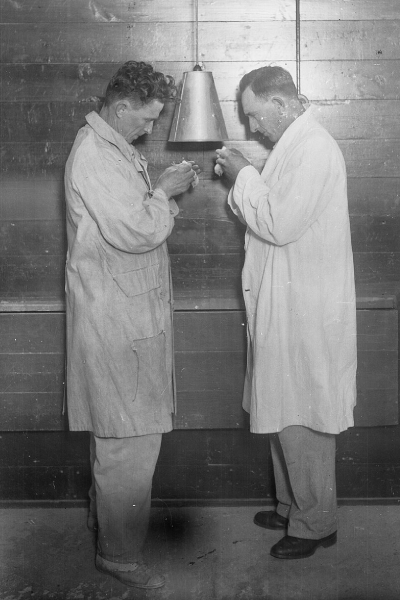9 Weird Jobs You Never Knew Existed
Not every job requires you to sit in an office cubicle as fluorescent lights flicker overhead. You’ll spend most of your life working a job as is, you might as well do something exciting, right?
Pause from your recession-proof job search. Instead of choosing a tech job that pays good, find a job that fits with your personality. ... a gig that lights you up and can make Mondays exciting again.
Let’s dive into some weird jobs that actually exist. Here’s what we’ll cover
- How realistic these jobs are
- How much they pay
- How to get started
- Skills and traits you'll need to be successful
Who knows, one of your crazy hobbies could even launch you into your next career.
1. Futurist
Welcome to the future of work. If you have a deep interest in emerging technologies and an eye for identifying changing societal trends, futurism could be in your future. While it’s a job title you might not have heard of before, many industries, from tech to finance, employ futurists to help them anticipate and prepare for the future.
There’s an added level of security in futurism. As a futurist, you can work in various sectors, including private companies, government agencies, and think tanks.
Entry-level positions in trend analysis or forecasting offer salaries ranging from $50,000 to $70,000. But depending on your background, experience, and education, you could earn well over six figures in this role.
As a futurist, you’ll open the door to other opportunities to earn money, too. You can land a book deal or schedule speaking gigs that will add to your bottom line.
Do you have what it takes to be a futurist? Here’s what you’ll need to be successful in this role:
- Read The News: Stay up to date on current events, especially in the realm of geopolitics, economics, technological advancements, cultural shifts, and other major global events.
- Be Analytical: You’ll have to be able to analyze data and recognize patterns. If you haven’t studied data analysis tools like R or Stata, now might be a good time to do so.
- Stay Curious: The most successful futurist is someone who always asks questions. You’ll want to stay on top of the news but with an eye to the future.
- Think Outside the Box: You need to be someone who always considers multiple perspectives and scenarios.
- Sharpen Your Communication: Reading the future isn’t easy. You need to be able to convey complex ideas that are NOT easy to understand.
- Remain Adaptable: The future is uncertain, and there may be times when you are wrong. Be prepared to chart a new course at a moment’s notice.
Now that you’re ready to become a futurist, here’s what you’ll need to get started:
- No Degree Needed: While this is a job that does not require a degree, backgrounds in sociology, economics, technology, or business can be beneficial. Some institutions like The Futurist Institute offer a certification in futurism.
- Network Yourself: Join professional organizations such as the World Future Society or the Association of Professional Futurists to connect with others in the field. Many job seekers underestimate the importance of networking.
- Build a Portfolio: The easiest way to get started is to just start. Write articles, give presentations, or create content that showcases your ability to anticipate future trends and scenarios.
2. Chicken Sexer
If you are ok staring at the backside of a baby chicken for hours a day, there is a poultry farmer out there who may be looking for you.
Chicken sexing determines the sex of day-old chicks, and a Chicken Sexer's job is to separate the males from the females to send them off to their rightful place. Chickens are raised differently depending on their purpose (aka whether or not they are going to lay eggs).
As a chicken sexer, you are only going to earn between $30,000 to $40,000 per year. However, experienced and highly skilled sexers who can work quickly and with high accuracy can earn double that.
Curious if you have what it takes? Here’s the personality and characteristics a poultry farmer is looking for:
- Attention to Detail: It can be hard to tell the difference between a male and female chicken. A keen eye for detail is crucial.
- Hand-Eye Coordination: This is definitely a hands-on job. You’ll have to handle delicate chicks that require dexterity and gentle hands.
- Stamina: Chicken sexing is far from glamorous. It's a repetitive job that can require handling thousands of chicks in a day.
- Patience: Mastering the art of chicken sexing takes time, and the learning curve can be steep. Patience can go a long way.
When you’re ready to get started, here’s what you’ll need to do:
- Training: Specialized training is required to become proficient in chicken sexing. Some poultry companies offer on-the-job training, while others might require potential hires to attend specialized courses.
- Apprenticeships: Gaining hands-on experience at poultry farms or hatcheries can be beneficial for this kind of job.
- Certification: In some regions or companies, certification might be required. Read up on local laws in your neck of the woods.
3. Netflix Tagger
Do you constantly find yourself bingeing the latest shows on Netflix? Then, get paid for it by becoming a Netflix tagger. You will need to watch and analyze Netflix content to assign appropriate tags, helping to refine the platform's recommendation algorithms and improve the viewer experience.
As a Netflix tagger – also known as a content analyst – you can expect to earn a salary in the range of $40,000 to $70,000. This can vary, though, depending on your experience, location, and if you’ve been hired as a part-time contractor.
Ready to be a professional couch potato? Here are the qualities you will need to emphasize on your resume:
- Keen Eye: You’ll need to be able to pick out nuanced themes, moods, and details in content.
- Organizational Skills: Categorizing vast amounts of content isn’t for the faint of heart. It will require systematic thinking.
- Good Memory: Be prepared to remember details about content you watched weeks or even months ago.
- Communication Skills: While you might watch shows alone, taggers often work in teams. You’ll need to communicate your insights effectively, especially if you’re working remotely.
If you think you’re the right fit for this job, here’s how you can get started:
- Take a Film Class: While it won’t stop you from becoming a Netflix tagger, having a background in film studies, media, or a related field can definitely help.
- Expand Your Genres: Being familiar with a wide range of genres and content types can be advantageous and land you more gigs.
- Sharpen Your Language Skills: Do you know a foreign language? Put it to use. There might be opportunities to tag content outside the U.S.
- Be Ready to Apply: These jobs go fast. Keep an eye on Netflix's job listings or entertainment job boards for new openings.
4. Mukbang Eater
Mukbang, a portmanteau of the Korean words for "eating" and "broadcast," is a gig that originated in South Korea. Mukbang eaters film themselves eating large amounts of food while interacting with an audience on platforms like YouTube or Twitch. Even though there are a lot of content creators out there, you could be the next big thing.
There isn’t a standard salary for a mukbang eater. Earnings can vary widely based on popularity, platform, and monetization strategy. As a new content creator, don’t expect to make anything when you start. That being said, popular mukbang creators with a large following can earn thousands of dollars per video through ad revenue, sponsorships, and fan donations. Some top mukbang YouTubers reportedly earn six figures annually, though this is rare.
Is all this talk about getting paid to eat making you hungry? Here are some traits you’ll need to be successful in this role:
- Be Comfortable On-Camera: Being genuine and engaging while eating in front of a camera can be nerve-racking, but it’s crucial if you want to become a successful mukbang eater.
- Stretch Your Stomach: Consuming large quantities of food can be physically demanding, especially when you have to make the whole process entertaining and engaging too.
- Have an Engaging Personality: Mukbang eating is a show, and you are the star. You have to be able to captivate and entertain viewers.
Fortunately, it’s never been easier to stream online. Here’s how you can get started right now:
- Choose a Social Media: Decide whether you want to broadcast live (e.g., on Twitch) or upload pre-recorded videos (e.g., on YouTube).
- Get Some Equipment: Get a good camera and some mics. Sound quality can make a significant difference in viewer retention.
- Develop Your Persona: It’s not just about eating but your performance. Develop a character and figure out what is going to set you apart from the competition.
- Keep Creating Content: Like most content creation, consistency is key. Create a production schedule and stick to it.
5. Seat Filler
You may finally get invited to the Academy Awards! Who will you be sitting by? - Maybe everyone. As a Seat Filler, your job is to make sure that when the camera cuts to the audience, there are no empty seats.
You will be working at major events, particularly televised ones like award shows. You are basically a sitting actor helping to create the appearance of a full house for the cameras.
Don’t expect to pull a full-time salary as a seat filler. Instead, you’ll get to attend some awesome events for free, and for a few moments, pretend you came with the movie star sitting next to you.
However, if you’re hired to work the Emmys, do not expect a paycheck. Your primary compensation for this role is the experience itself... and some very cool name-dropping stories.
Here’s the type of person Hollywood is looking for:
- Be Punctual: You have to be on time. Event organizers will want to make sure the scene is set before the show starts.
- Have Flexibility: Even though you’ll be sitting, you might not stay in one place for long. Expect to be asked to move multiple times during the event.
- Act Professional: It’s very likely you’ll cross paths with an A-list celebrity. Keep it professional – autographs or selfies can wait.
- Dress Fancy: Depending on the event, you might have to adhere to a strict dress code. If you’re asked to dust off your tux, dust it off.
- Stay Patience: There can be a lot of hurry up and waiting with this type of gig. Pack a book to read and maybe a snack or two.
Think this could be your big break? Here’s what you’ll need to do to get started:
- Research Agencies: There are agencies that specialize in providing seat fillers for events. Signing up with one can increase your chances of getting selected.
- Stay Updated: Keep an eye on major events in your city. Many will have a call for seat fillers in the days leading up to the event.
- Do Some Networking: Sometimes, knowing someone in the industry can give you a leg up. Invest in building a diverse network if you’re seriously considering this.
6. Helicopter Tree Trimmer
Looking for your next thrill? Helicopter tree trimming is a specialized job primarily used to maintain clearances around power lines in hard-to-reach areas. It involves using helicopters equipped with large aerial saws to trim trees. This method is often faster and can be more cost-effective than traditional ground-based tree trimming, especially in difficult terrains.
Helicopter tree trimmers or aerial saw operators can expect a higher-than-average salary compared to traditional tree trimmers. On average, a helicopter tree trimmer might earn anywhere from $50,000 to $80,000 annually, depending on experience, location, and the complexity of the operations they're involved in. Pilots and those with more specialized roles may earn even more.
Think you have what it takes to be a helicopter tree trimmer? Here are a few traits that’ll make you successful in this role:
- Have Precision: You’ll be working near live power lines in populated areas. There won’t be much room for error.
- Think "Safety First": This is definitely a high-risk job. Make sure you prioritize keeping yourself – and your crewmates – safe.
- Stay Physically Fit: Even though you're in a helicopter, the job can be physically demanding, especially when dealing with equipment.
- Communication Skills: You'll often be working in tandem with a ground crew or other team members. So, brush up on your radio talking skills - OVER. Your good communication will help you avoid mistakes and could save your life.
Ready to take your career to new heights? Here’s how to get started:
- Get Your Pilot's License: If you're piloting the helicopter, you'll need a commercial helicopter pilot's license. If you don’t have one, start taking steps to get one.
- Specialized Training: Beyond traditional tree trimming knowledge, you'll need training on aerial equipment and safety protocols for helicopter tree trimming.
- Get a job at a Utility Company: Many of these positions are available through utility companies or contractors that work with them.
- Gain Experience: Start on the ground first. Learn the basics of tree trimming before applying to a helicopter role.
7. Professional Sleeper
Have you ever dreamed of getting paid to sleep? You might have what it takes to become a professional sleeper. These individuals are typically hired for scientific research studies related to sleep, sleep disorders, or even for testing products like mattresses or sleep aids. Their main job is to sleep under monitored conditions so researchers can gather data.
Compensation can vary widely based on the nature and duration of the study. For shorter-term studies, a professional sleeper might earn a stipend ranging from $100 to $500. However, for longer, more intensive studies, they might earn several thousand dollars. Many of these positions are temporary. Finding consistent work as a professional sleeper might be hard to come by.
Ready to hit snooze? Here are some traits that will make you successful in this role:
- Show Reliability: Researchers need consistent data. You’ll need to be available and show up on time to stick to their study protocols.
- Be Comfortable in Clinical Settings: You probably won’t be sleeping in your own bed. Instead, you’ll probably be hooked up to machines that monitor you as you sleep.
- Stay in Good Health: Many studies seek participants without sleep disorders or other health issues that might skew results. If you have a pre-existing condition, you might not be a good fit.
If you’d like to add "professional sleeper" to your resume, here’s how you can get started:
- Look for Opportunities: Find sleep clinics advertising via universities, or research institutions who might be conducting sleep studies and are in need of your services.
- Pack a Pillow: Since some studies might require overnight stays for extended periods of time, you’ll need to have a flexible schedule.
- Join Sleep Databases: Some research institutions maintain databases of potential study participants for future research. Joining these can increase your chances of being selected down the road.
8. Line Stander
Opposite of getting paid to sleep, a line stander gets paid to stand in line. Individuals or companies hire line standers to hold a spot in long lines, whether it's for product launches, sample sales, theater tickets, or even to snag a table at an uber-exclusive restaurant.
Compensation for line standers can vary based on the demand for the event or service and the duration for which you’ll be standing. On average, a line stander can expect to earn anywhere from $15 to $50 per hour, with some high-demand events fetching even higher rates. Some professionals can also earn bonuses or tips based on the success of their wait.
Have some time to kill? Here are the traits that you’ll need to be a successful line stander:
- Patience: Waiting in line for extended periods can get boring really quickly. Bring a book and get paid to wait.
- Punctuality: Getting in line too late can mean missing out on something big. Be on time or even early to secure a good spot in line.
- Stamina: This gig can entail standing in line for long hours and during adverse weather conditions. It’ll not only be physically demanding, but it can be draining too.
- Reliability: Clients are relying on you to hold their spot in line. Being trustworthy and sticking to the commitment is key.
Do you have what it takes to be a line stander? Here’s how you can get started:
- Look for Gigs: Check local classifieds, platforms like Craigslist, or dedicated websites that offer line standing services.
- Build a Network: Repeat clients can provide steady gigs. Presenting yourself in a professional manner can lead to word-of-mouth referrals.
- Stay Updated: Keep an eye out for upcoming high-demand events or product releases in your area.
9. Professional Mourner
Similar to a seat filler, professional mourners help create the atmosphere of an event. They are hired to attend funerals and grieve for the deceased. Their presence can either augment the number of attendees or provide an atmosphere of sorrow, especially in cultures where vocal lamentation is customary.
The pay for professional mourners varies based on the cultural context, region, and specific expectations of the role. On average, a professional mourner might earn anywhere from $30 to $120 per funeral, with some specialized or experienced mourners charging even more, especially if they perform specific rituals or songs.
Do you think you might make a successful mourner? Here are the traits you’ll need to have to be successful:
- Empathy: Even though you're being paid, showing genuine respect and sensitivity is crucial.
- Flexibility: Different funerals or cultures might have different expectations. Be as flexible as your clients need you to be.
- Vocal Skills: Depending on the type of funeral, you might be expected to wail or sing.
- Cultural Sensitivity: Understanding and respecting various funeral rites and traditions is essential.
Ready to explore the prospects for this job? Here’s how you can get started:
- Research Cultural Practices: Understand the mourning customs of different cultures. This can set you apart and help you offer specialized services.
- Network: Talk with funeral homes, directors, or religious leaders. They might be able to provide leads on potential gigs.
- Advertise Your Services: Use Craigslist or post an ad on Facebook to see if you can find any prospects.
Bonus: Weird Freelance Jobs
Beyond the crazy jobs we've already mentioned, there are even more weird jobs in the world of freelance. Some of these include weird freelance jobs like:
- Pet Food Taster - In this role, you taste-test pet food products to ensure quality and palatability.
- Snake Milker - Extract venom from snakes for medical research and antivenom production.
- Fortune Cookie Writer - Write fortunes and inspirational messages inside fortune cookies.
Not all jobs will keep you stuck at a desk for eight hours a day. These are just a few weird jobs that can make work exciting again. So, while you are asking, what is the best career for me, consider one of these unconventional jobs and give yourself a fun break.



.png)













.jpeg)



